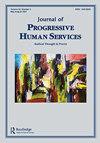Macro MI: Using Motivational Interviewing to Address Socially-engineered Trauma
IF 0.8
Q1 SOCIAL WORK
引用次数: 1
Abstract
ABSTRACT Decades of social science data have illuminated how oppression and inequality on the macro levels of society can manifest as trauma and deprivation on the individual or micro level. However, clinical pedagogies within human services fields (social work, substance use disorder treatment, psychology, psychiatry) do not adequately reflect these advances. This creates barriers for service providers seeking to address socially-engineered trauma, i.e., trauma occurring in the context of oppressive macro structures such as white supremacist racism, neoliberal economic policies and cisgender-heteropatriarchy. Service provision that is structurally competent, on the other hand, exists at the intersection of macro and micro and offers both ethical and clinical advantages. Given its traditional focus on eliciting behavior change on the micro level, the therapeutic modality of motivational interviewing (MI) may not attract attention as a tool for addressing systemic social injustice. However, by integrating key elements of MI with SHARP – a framework for addressing oppression and inequality – new options for structural competence emerge. The resulting hybrid, Macro MI, offers tools to join with clients to assess the impact of structural oppression on individual problems, as well as to envision solutions that include macro systems change. Underpinning this approach is a belief that the collective work of tearing down and replacing the systems that create trauma is central to healing the wounds inflicted by oppression. Within Macro MI, activism, organizing and consciousness-raising are interventions to treat PTSD as well as tools for preventing trauma from occurring to other members of the community.宏观MI:利用动机访谈解决社会工程创伤
几十年的社会科学数据揭示了社会宏观层面的压迫和不平等如何表现为个人或微观层面的创伤和剥夺。然而,人类服务领域的临床教育学(社会工作、药物使用障碍治疗、心理学、精神病学)并没有充分反映这些进步。这为寻求解决社会工程创伤的服务提供商制造了障碍,即在白人至上主义种族主义、新自由主义经济政策和顺性别异家长制等压迫性宏观结构背景下发生的创伤。另一方面,结构上合格的服务提供存在于宏观和微观的交叉点,并提供道德和临床优势。鉴于其传统的关注点是在微观层面引发行为改变,动机访谈的治疗模式可能不会作为解决系统性社会不公正的工具而引起关注。然而,通过将MI的关键要素与SHARP(一个解决压迫和不平等问题的框架)相结合,出现了结构能力的新选择。由此产生的混合体Macro MI提供了与客户合作的工具,以评估结构性压迫对个人问题的影响,并设想包括宏观系统变革在内的解决方案。这种方法的基础是一种信念,即拆除和替换造成创伤的系统的集体工作是治愈压迫造成的创伤的核心。在Macro MI中,行动主义、组织和提高意识是治疗创伤后应激障碍的干预措施,也是防止社区其他成员遭受创伤的工具。
本文章由计算机程序翻译,如有差异,请以英文原文为准。
求助全文
约1分钟内获得全文
求助全文
来源期刊

Journal of Progressive Human Services
SOCIAL WORK-
CiteScore
3.20
自引率
8.30%
发文量
14
期刊介绍:
The only journal of its kind in the United States, the Journal of Progressive Human Services covers political, social, personal, and professional problems in human services from a progressive perspective. The journal stimulates debate about major social issues and contributes to the development of the analytical tools needed for building a caring society based on equality and justice. The journal"s contributors examine oppressed and vulnerable groups, struggles by workers and clients on the job and in the community, dilemmas of practice in conservative contexts, and strategies for ending racism, sexism, ageism, heterosexism, and discrimination of persons who are disabled and psychologically distressed.
 求助内容:
求助内容: 应助结果提醒方式:
应助结果提醒方式:


